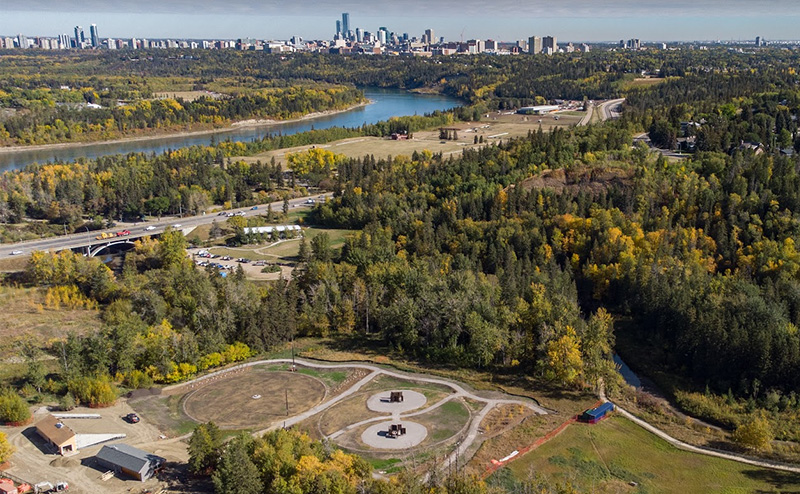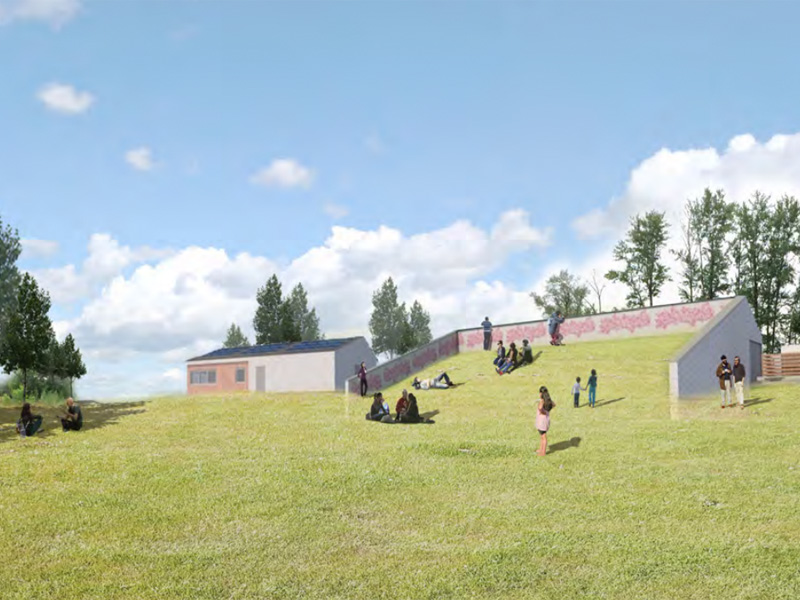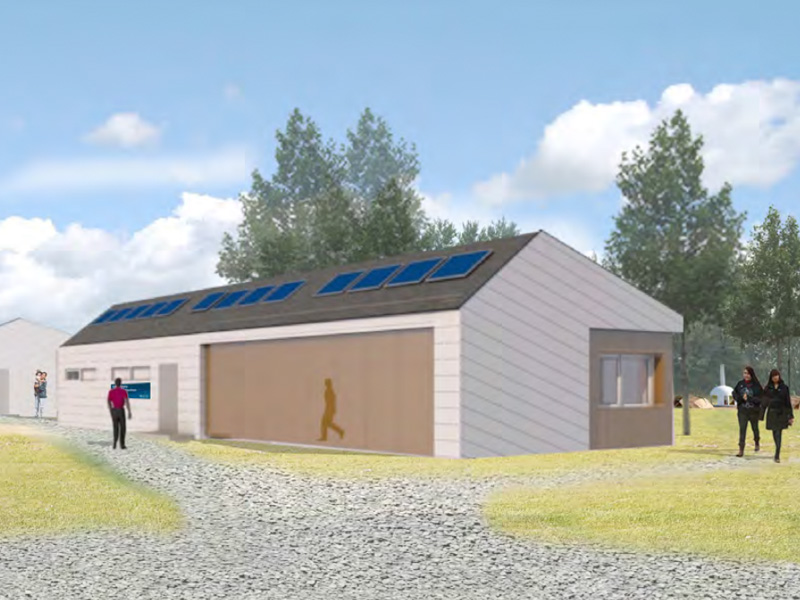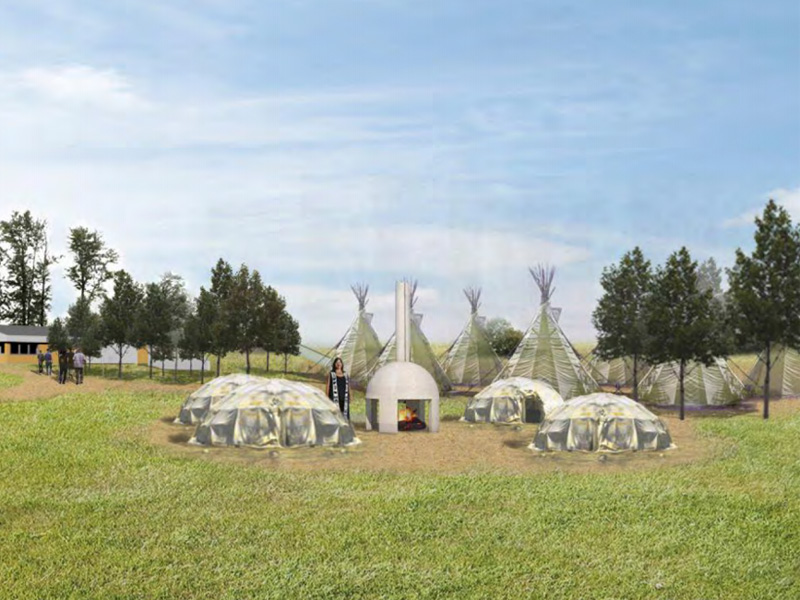1) Why was this site chosen and what is the significance of this location?
The kihcihkaw askî site, located at 14141 Fox Drive NW, is historically and culturally significant and has served as a ceremonial site in the past. Long before becoming farmland, the kihcihkaw askî site was used for many centuries by the Indigenous people harvesting medicines for healing purposes. Ochre, a rare mineral, is also found close to the site and was (and is) used in spiritual and traditional ceremonies. Due to this significance, the Fox Farms site was chosen for the kihcihkaw askî project. Learn more about the history and importance of this project in the City of Edmonton information session recording.
2) Why did the name of the site change?
Until late 2022, the name kihciy askiy (Sacred Land) had been used for the site. The Elders felt “kihciy askiy” was too general of a term, as it translates to “sacred land.” The appropriate term suggested was “kihcihkaw askî”, which means “This place here is Sacred”. IKWC worked with the kihciy askiy Elders Counsel, local Cree linguists and language teachers, and University of Alberta Cree linguists to ensure the correct roman orthography spelling and Cree syllabics were being used for the name. Recognizing the different Plains Cree dialects, this led to a comprehensive discussion around the usage of kihciy askiy and the consensus was that kihcihkaw askî-Sacred Land was the most appropriate terminology for kihciy askiy as it represents the Plains Cree language dialect as spoken and written in orthography in the Edmonton region.
3)When did the site open?
The Indigenous Knowledge & Wisdom Centre (IKWC) began operating the site in early 2023. IKWC hosted an open house for the public to tour and learn about kihcihkaw askî in September 2023.
4) What are the hours of operation for this site?
The site is open daily from 9am to 4:30pm.
5) Who owns the title to the land?
The City of Edmonton is the title owner to the land.
6) Will the land title be transferred to IKWC at some point as part of reconciliation?
The land was gifted by the Fox family to the City in 1968 for the purpose of public recreation and enjoyment. The establishment of kihcihkaw askî is aligned with this intention. IKWC will operate the site under a license agreement with the City. This arrangement enables IKWC to focus on programming the site, while the City services the site and buildings. At this time there are no plans to transfer the land title to IKWC.
7) What types of programming will take place at this site? Will it be noisy?
The kihcihkaw askî site provides a natural setting for hosting ceremonies, practicing traditional arts and sciences and facilitation of intergenerational and land-based teachings. The types of ceremonies and programming that take place at kihcihkaw askî will include sweatlodges, pipe ceremonies, traditional teachings and an outdoor tipi and educational space.
kihcihkaw askî is a solemn site for Indigenous ceremonial gathering. Events such as pow-wows will not be held here, and the partner groups will make efforts to reach out to engage the neighbourhood and surrounding communities. This facility will also adhere to the City of Edmonton Noise Bylaw 14600. There is a limit of 100 people on site at one time.
Learn more about the operations of this site in the
public information session presentation.
8) Will there be a beautification aspect to the park? Will there be a garden similar to the Indigenous Garden at the Botanical gardens?
A healing garden, presenting traditional herbs and plants in the form of a medicine wheel, will provide education about Indigenous culture in the currently unfunded Phase 2 portion of the project. Indigenous artwork could be incorporated into the healing garden.
9) Did the project consider the use of natural gas for space heating and fire pits?
Natural gas will not be used for the space heating or the fire pits.
10) Some utilities need to be relocated, such as power or gas. Who is responsible for the cost for these moves?
The City of Edmonton is responsible. This is part of the project budget.
11) What is the history of public and Indigenous engagement and City Council decision-making?
The City conducted the following public engagement and Indigenous consultation:
1968 - The City acquired the former Fox Farm site.
2003 - The Whitemud Integrated Area Concept Plan was developed and approved by City Council.
2006 - The City receives a proposal from the Indigenous Elders Cultural Resource Society to create a permanent site for Indigenous cultural events and learning experiences for both Indigenous and non-Indigenous people.
2009 - The Whitemud Integrated Area Concept Plan is amended to include the development of the cultural site called kihciy askiy (now kihcihkaw askî). A public open house was held in 2009.
2014 - City Council approves funding in the 2015-2018 budget for kihcihkaw askî Phase 1.
2015 - Public engagement in Design. When the design of the project formally began in 2014, it was exempted from the public engagement policy/process due to the nature of the ceremony and programs that will take place. The engagement took place with Indigenous Elders, Knowledge Keepers, Native Counselling Services of Alberta, and now the IKWC.
2015 - Demolition of old Fox Farm buildings.
2015-2017 - Indigenous consultation, design and environmental review.
2018 - Council approves the Environment Impact Assessment and Site Location Study. Edmonton Design Committee approves the design and a Development Permit is issued.
2019 - With direction from Council, the Indigenous Relations Office works with Indigenous community partners to identify potential partners that could finalize and implement a governance and operations model.
2020 - The City begins working with the IKWC. City Council approved the release of capital funding required for construction.
2021 - The City re-engaged the design consultant to update the drawings to current code and COE standards.
Under the leadership and direction from the kihciy askiy (now kihcihkaw askî) Counsel of Elders, the previous operating partner, Native Counselling Services of Alberta, engaged Indigenous spiritual leaders living in the capital region through two Grand Council Gatherings of Elders in 2015 and 2018.







